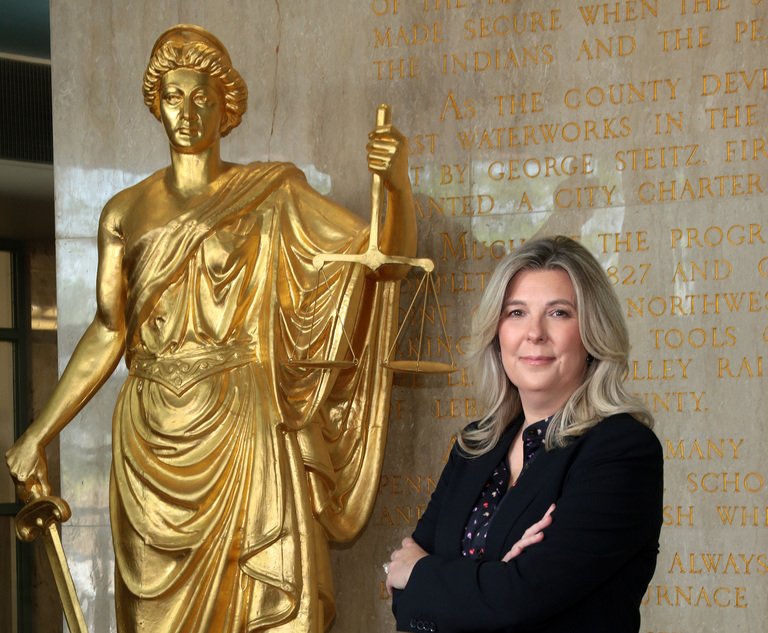Candidate: Megan Ryland-Tanner
Court: Lebanon County Court of Common Pleas
Party: Democrat
The following has been edited lightly for length and style.
The Legal Intelligencer: How would you describe your judicial philosophy?
Megan Ryland-Tanner: Judicial minimalism. It is important to look at each case individually on the basis of its facts. I do not believe the courts should legislate from the bench.
The Legal: What makes you the best candidate for the role?
Ryland-Tanner: I have been an attorney for 22 years and involved in the legal system for even longer. My legal experience is well rounded, giving me experience in courtroom litigation for both civil and criminal matters. Courtroom experience is a must for a judge.
Another qualification is my commitment to fairness and impartiality and deciding each and every case only after all the evidence has been presented. Applying the law is also important. A judge’s personal and political beliefs do not belong in the courtroom.
The Legal: What is the greatest threat to the practice of law or problem the profession faces?
Ryland-Tanner: Accountability. I believe that the legal system is not as highly regarded as it once was because it has been lax in adhering to our ethical standards and to holding attorneys and judges accountable for professional lapses.
The Legal: What does your party membership say about you and your legal outlook?
Ryland-Tanner: My personal opinions and values are generally in line with a conservative outlook. However, I believe my decisions should not be influenced by personal opinions beyond my belief that the courtroom should be true to the law, including the U.S. and Pennsylvania constitutions.
The Legal: Do you think courts in Pennsylvania have a perception problem when it comes to appearing partisan or polarized? If so, what would you do to combat this?
Ryland-Tanner: I think there is a perception, especially in our appellate courts, that political beliefs are determining decisions. I would ensure that my beliefs do not get in the way of making the right decision. Legislating from the bench is unacceptable.
The Legal: Several CLEs and bench-bar panels have recently addressed the growing phenomenon of distrust in the courts. In your view, how has distrust in the judiciary created challenges for the bench, and how should judges respond?
Ryland-Tanner: I think part of the problem is that the average citizen is unclear as to the role of the courts. Education is the best way to combat this type of issue. Getting schools and civic groups into the courtrooms will go a long way.
Additionally, when people believe that the judge has an agenda or is allowing his or her political or personal beliefs to decide a case causes a great deal of distrust. A judge needs to focus on the facts in front of them and apply the law to those facts. Being transparent and treating everyone equally is crucial. Strictly adhering to the ethical rules and holding people accountable for bad behavior will also assist in regaining the public’s trust.
The Legal: What factors matter in deciding when recusal is necessary, and would you recuse yourself if a campaign contributor were involved in litigation as a party or attorney before you?
Ryland-Tanner: There are always going to be matters which are black and white. However, there will also be times when it is not so easy to discern if a recusal is appropriate. I think a judge needs to remember that the appearance of a conflict can be just as problematic as an actual conflict. At the same time, it is important to ensure that parties are not able to use this to manipulate a situation in order to go before a particular judge.
Campaign contributions are one of those areas where there is at least the potential inference of a conflict. In the beginning, I think it is important to recuse oneself from a case where one of the parties contributed to a judge’s recent campaign. However, as time goes on, I believe that becomes less of an issue.
The Legal: Who are your role models and mentors?
Ryland-Tanner: There are many people I would view as a role model or mentor. My family and our faith have clearly shaped me as to the person I am and want to be. There have been various members of our local bar who have also affected the way I practice law. Being available to assist younger attorneys is essential. Lebanon County has been fortunate to have older members of our bar consistently willing to make themselves available to provide guidance to junior attorneys.
NOT FOR REPRINT
© 2024 ALM Global, LLC, All Rights Reserved. Request academic re-use from www.copyright.com. All other uses, submit a request to [email protected]. For more information visit Asset & Logo Licensing.


 Megan Ryland-Tanner, candidate for the Lebanon County Court of Common Pleas. Courtesy photo.
Megan Ryland-Tanner, candidate for the Lebanon County Court of Common Pleas. Courtesy photo.





